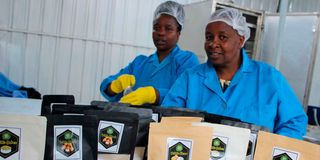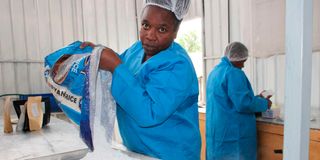Meet the women who made Europe crave Kenyan potatoes

Teresia Wanjiku (left) and Mary Muigai, (Kiwafa secretary and chairperson respectively) at the potato value addition plant in Ol Joro Orok, Nyandarua County. Kiwafa Women's Group is rewriting the rules of agricultural value addition.
What you need to know:
- The Kiwafa Women-Self Help Group in Nyandarua County has transformed Irish potato farming by creating a thriving enterprise.
- Starting with modest beginnings 16 years ago, the group secured a Sh1.2 million grant to acquire modern processing equipment, enabling them to process up to 14 tonnes of potatoes daily.
- Despite current potato shortages limiting their production to two tonnes daily, the group has caught the attention of European and Middle Eastern pharmaceutical companies and is poised to enter export markets.
Next time you are savouring a rich soup or indulging in a starch-enriched delicacy in the European Union or the Middle East, you might be enjoying a product crafted by the enterprising Kiwafa Women-Self Help Group from Nyandarua County.
The group has expertly transformed Irish potatoes into a diverse range of high-value products, including flour, crisps, and animal feed.
While the group has established a robust presence in the local market, its primary focus is on producing starch — a product with substantial growth potential in both domestic and international markets due to its applications in pharmaceuticals, food processing, and other industries.
Their ambitions extend to sectors such as pharmaceuticals, wholesale and retail outlets, and food processing, with plans to explore ethanol production.
Operating with close attention to detail, the women of Kiwafa work in shifts and collaborate as a team, each member fulfilling specific roles such as receiving and weighing potatoes from farmers.
They oversee various stages of the value-addition process to ensure that every product meets rigorous quality standards.
Founded 16 years ago in Ol Joro Orok Constituency, the group has successfully engaged with 600 potato growers, all of whom adhere to stringent agronomic practices to uphold the group's high standards.
While many potato growers struggle with low prices and exploitation by middlemen, those who have partnered with the Kiwafa Women-Self Help Group benefit from a more equitable system.
Unlike traditional brokers who favour bulk sales in overweight bags, Kiwafa's model allows farmers to sell their produce by the kilo, ensuring fair compensation.

Teresiah the group Secretary at their Irish potato value addition plant in Nyandarua.
Initially, despite their professional qualifications, some members of the group experienced unemployment due to the economic downturn.
Recognising the potential within the potato value chain, they conducted extensive research and pivoted to this new venture, which has since led to significant success and job creation.
Over time, the group has developed a range of products under the WAFA brand, including potato flour, cubes, crisps, animal feeds, and starch.
According to John Njoroge, a contracted grower, "The women's group has successfully addressed gaps in the potato value chain. By purchasing potatoes by the kilo, they have encouraged many farmers to engage in contract farming. Kiwafa offers payments ranging from Sh30 to Sh70 per kilo, depending on the season, provided that farmers adhere to best practices as outlined by agronomists and the Kenya Plant Health Inspectorate Services (Kephis)."
Teresa Wanjiku, the group secretary, notes that a significant milestone was achieved two years ago when Kiwafa secured a Sh1.2 million grant from the Kenya Climate Innovation Centre (KCIC).
This funding enabled them to acquire one-tonne-per-hour potato processing equipment.
Polly Mwongera, KCIC Hub Manager for Nyandarua, explains that Kiwafa was selected for the grant due to their demonstrated potential to tackle challenges in potato marketing, generate employment, and ensure business sustainability.
"We assisted them in obtaining Kenya Bureau of Standards certification for all their products. The group's impact on supporting other small-scale farmers was also a key factor in our decision," she adds.
Before transitioning to potato farming, the group attempted to grow tree tomatoes but faced difficulties due to a lack of specific farming knowledge and inadequate access to market opportunities.
"When we transitioned to potatoes, we initially produced crisps, dried cubes, and fresh cuts. However, through training, we expanded our knowledge and now offer products that are in higher demand," explains Mary Muigai, the group's chairperson, adding that their main challenge was the high cost of processing equipment, which was addressed when KCIC provided them with the necessary resources.
Mary recalls that in 2020, the group missed an opportunity to supply 10 tonnes of potato products to Tuskys Supermarket due to inadequate processing equipment.
"Under optimal conditions and best farming practices, an acre of land can yield up to 14 tonnes of Irish potatoes. Our members are required to follow stringent practices, with farms subject to random inspections by Kephis. We procure potatoes from aggregation stores, and our contracted farmers receive clean, certified seeds from our propagation farm. To lower production costs, we utilise solar-powered equipment," she says.
Mary notes that the Shangi variety of Irish potato contains 17 percent starch.
This means that six kilograms of fresh potatoes are required to produce one kilogram of starch.
The cost of raw potatoes ranges from Sh30 to Sh70 per kilogram, while the selling price of starch is Sh700 per kilogram.
On average, a tonne of Irish potatoes yields 200 kilograms of starch.
Address gap
"Due to the high demand for starch, we are expanding both our processing facilities and storage capacity. Additionally, we are exploring ways to convert potato peelings into animal feed, which will create more job opportunities and provide farmers with high-quality feed supplements," she claims.
Due to a current shortage of potatoes in the country, the women's group is processing only two tonnes of potatoes daily, and is actively seeking to contract farmers in Tanzania to address this gap.
Mary explains that the potato shortage occurred at a particularly inopportune moment, as they were finalising agreements with several food processing and pharmaceutical companies from Europe and the Middle East.
"These companies had already visited our processing plant and engaged with local farmers to verify quality throughout the production chain. Additionally, we had a Nigerian food processing company interested in our starch and potato cubes. Unfortunately, the current shortage has restricted us to supplying only Kenyan customers," she says.
Under normal circumstances, the group processes up to 14 tonnes of potatoes per day.
At the beginning of their value-addition venture, the group encountered considerable marketing challenges due to limited visibility.
The obstacle was successfully overcome with the assistance of the County Government's Trade and Cooperative Development Department.
Mary explains that the trade department identified them as one of the cottage industries eligible for nationwide exhibitions. These events proved instrumental in establishing connections with many of their current customers.
Nyandarua County has gathered comprehensive data on all common interest groups engaged in value addition and will offer support through market linkages and equipment.
The County has invested over Sh100 million in value-addition initiatives, including Sh40 million allocated this year. These investments aim to foster job creation through enhanced value addition.
John Muiru, Executive Member of the Trade and Cooperative Department, states that to further support these initiatives, the county is activating the county trade fund through the Nyandarua Trade Development and Investment Board.
"Capital has often been a barrier to many innovative projects. For example, the Kiwafa Women Self Help Group took several years to reach their current level of success due to limitations in capital and exposure. We are committed to supporting such ventures, and the operationalisation of the Trade Fund, with the board already in place, will provide timely assistance to innovative ideas," he explains.
Muiru notes that strengthening cooperative societies has facilitated greater support for innovative ideas.
To enhance their marketing strategies, the women's group has sponsored some members and their children to pursue courses in marketing and ICT. The initiative has not only created job opportunities for the members and their families but also benefited the local community.
Mary is confident that, with their team of trained marketing and IT experts, and support from the county government, the venture is strategically positioned to enter export markets.
She says the marketing and ICT team is highly dedicated and aligned with the group's vision although their current challenge is addressing the potato shortage to fully meet customer demand.
"Despite high demand for our products, we are addressing the issue by contracting additional farmers and working closely with the county government, which is also dedicated to improving potato production. Furthermore, the imminent operationalisation of the 100,000-metric-tonne Ol Kalou Cold Storage plant will significantly help mitigate these challenges," she says.




